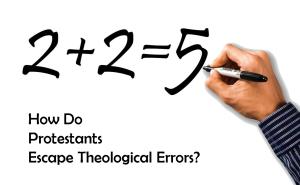Recently, Catholic apologist Trent Horn debated Protestant pastor and YouTuber, Dr. Gavin Ortlund, on whether or not sola scriptura is true. I highly recommend the debate, as those involved acted respectfully, charitably, and knowledgably. One particular subject of interest for this article occurred during the question-and-answer segment of the debate. An audience member asked Dr. Ortlund to critique three points and a conclusion.
- No church can avoid schism without a Supreme Court.
- A Supreme Court has to be infallible or else one party will appeal beyond the court to an infallible source.
- God intended there not to be a schisming church.
Therefore, an authority must exist that is infallible outside of scripture.
Dr. Ortlund’s response to this line of reasoning piqued my interest.
In this article, I examine Dr. Ortlund’s preference for multiple fallible (and unbinding) beliefs over infallible (and therefore binding) ones. I show that, while seemingly this preference allows for him to maintain his view of sola scriptura, the consequence of his preference puts all Christian beliefs on the proverbial chopping block. Core beliefs like the Trinity, dual nature of Christ, Incarnation, Atonement, to name a few, become mere theological opinions. In the end, one question to ask Dr. Ortlund is this: after two-thousand years, how do you avoid theological errors?
Dr. Ortlund’s Response
In response to the three points above, Dr. Ortlund states (semi cleaned up for clarity):
I’ve been thinking about this distinction between infallibility and authority a lot. I’m not persuaded that infallibility is the save all that’s gonna keep us together…There’s a double-edged sword here. The greater power you have to unify the greater power to bind unto error. If that’s not truly of divine institution, which is the question, we would then want to answer on historical and theological grounds, not philosophically. Then we, by adhering to such, could find ourselves in a situation where we are like the people [during] the Pharisees’ age getting yoked to error. So that would be the concern in the opposite direction.
And:
The ability to revise things. The ability to make corrections. That is why I’m a Protestant, because we make mistakes as the church, and we got to fix them. You get stuck in the other traditions, it seems to me, with errors and what can you do? You can’t submit in your conscience to what you think is an error if you’re stuck with it forever. The glory of Protestantism is semper reformanda. You can continually reform.
Dr. Ortlund’s Position Summed Up
To sum up Dr. Ortlund’s position: the Church does not need an infallible authority to prevent schism. The more authority an institution has, the more power it has to bind its members to error (if not of divine origin). We see this at work with the Pharisees during Jesus’ time. Moreover, the church (and those in her) make mistakes, therefore the church requires constant reformation or semper reformanda. Other traditions, like Catholicism, get stuck with errors that cannot change. Due to infallibility, Catholics find themselves forever trapped in error, errors their conscience cannot escape, again, due to infallibility. Protestantism’s greatest glory is its ability to constantly reform, to correct itself. In short, multiple fallible and unbinding beliefs appear to Dr. Ortlund preferable over infallible and binding ones. Better unbound to fallible “truths” than bound to infallible “error.”
Unbound to Fallible Beliefs
I wrote an article in January of this year titled God’s Message in an Unbreakable Bottle: An Infallible Church. In this article, I compared the Church to an unbreakable bottle containing God’s message of salvation for the world.
Consider God sends a message in a bottle. The message contains the salvation of mankind. Since the salvation of mankind is at stake, God decides to send this message in an unbreakable bottle. God also possesses the power to make the bottle unbreakable. Furthermore, the fallibility and unreliability of human nature, especially in the transmission and dissemination of knowledge, requires an unbreakable bottle. The bottle contains the Bible and the deposit of faith. The unbreakable bottle is the infallible Church.
Moreover, the article goes on to demonstrate the danger of errors that arise within the Church, errors that may well determine the ultimate destination of people’s souls. Dr. Ortlund contends Christ established a Church, not of divine origin, but a human one that constantly errs and needs constant correction. If so, what hope do Christians possess that they do not currently believe erroneously? Furthermore, if the Church, as a human institution, errs, core Christian beliefs like the Trinity, dual nature of Christ, Incarnation, the Atonement, and biblical reliability become mere theological opinions. By declaring the Church fallible, Dr. Ortlund places equal doubt on his own infallible authority—the Bible. The Bible, too, emerged from the Church over the course of four centuries as a “tradition.” Why trust the Church on this one tradition and not others?
Who Do You Trust?
In the 5th century, St. Vincent of Lerins observed:
Since the canon of Scripture is complete, and is in itself abundantly sufficient, what need is there to join to it the interpretation of the Church?
This seems a relevant observation concerning any discussion on sola scriptura. He goes on…
…because of the very depth of Scripture, all men do not place one identical interpretation upon it. The statements of the same writer are explained by different men in different ways, so much so that it seems almost possible to extract from it as many opinions as there are men. Novatian expounds in one way, Sabellius in another, Donatus in another, Arius, Eunomius and Macedonius in another, Photinus, Apollinaris and Priscillian in another, Jovinian, Pelagius and Caelestius in another, and latterly Nestorius in another.
Those mentioned above were declared heretics by the Church. In other words, those above erred so badly they incurred the condemnation of the universal Church. Anyone who believed the same as these men likewise incurred condemnation. The Catholic Church bound all Christians within the Church to these declarations known as anathemas. Back to St. Vincent…
Therefore, because of the intricacies of error, which is so multiform, there is great need for the laying down of a rule for the exposition of Prophets and Apostles in accordance with the standard of the interpretation of the Church Catholic.
The Case of Arius
As an aside, many of those condemned by the Church often appealed primarily to scripture alone. Case in point, Arius. Arius proclaimed in his defense that the Son was not coequal to the Father:
But since many persons are disturbed by questions concerning what is called in Latin substantia, but in Greek ousia, that is, to make it understood more exactly, as to ‘coessential,’ or what is called, ‘like-in-essence,’ there ought to be no mention of any of these at all, nor exposition of them in the Church, for this reason and for this consideration, that in divine Scripture nothing is written about them, and that they are above men’s knowledge and above men’s understanding; [emphasis added]
Additionally, should it not concern those who appeal to sola scriptura that they use the same methodology as Arius? Can they say with any sense of certainty that Arius is incorrect and they are correct? Arius was also a learned scholar and validly ordained minister of the Church. In truth, his opinion holds as much authority then as any Protestant today.
Multiples of Fallible Beliefs Can Only Guarantee Multiple Errors
In conclusion, the preference for fallible unbinding beliefs over infallible binding ones creates more problems than it intends to solve. A church that errs and therefore always reforms cannot, in the end, accurately determine the difference between truth and error. All Christian beliefs are fallible and so all Christian beliefs are mere opinion. Some informed opinions, yes, but opinions, nonetheless. The alternative, that Jesus established a Church (a divine institution), and gave this Church the gift of infallibility, raises mere theological opinion to the level of binding doctrine and dogma. It gives weight to beliefs like the Trinity, the Incarnation, the Atonement, and the reliability and authenticity of the Bible.
If you enjoy my writing and want to support my work, please consider donating a monetary gift of any size or quantity by clicking here. Thank you!
Read my other writing here.
Please click the link below to join.
Voices of the Faithful in the Synod on Synodality
Please make your voice heard.
I Support Church Teaching in the Synod of Synodality

















